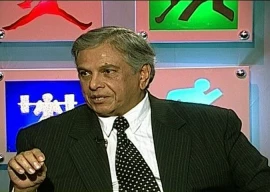
This trend began to emerge with the correlation of the growing influence of the International Monetary Fund (IMF) in Pakistan’s financial affairs, which decided to “assist” Pakistan via $11.3 billion lending facility in 2008. Ever since Pakistan’s banking sector grown to historic levels and has become a magnet for profitability. Foreign banks such Barclays and Royal Bank of Scotland have arrived to the party in a timely fashion. The Banking sector of Pakistan posts an average profit of 36.41% (as a percentage of average capital) and surprisingly this figure is ranked number worldwide (Europe Banking sector posts an average profit of 8%). Unfortunately, during the same time the disparity between upper class and the rest of the society has grown tremendously.
The financial model employed by the banks operating within Pakistan, adopt the same principles - the same philosophy - that has been responsible for leading the Western hemisphere into the its current financial catastrophe, a catastrophe that has already embarked on historic proportions and is still, even by conservative estimates, a decade removed from losing its momentum. This model transfers wealth from the lower and middle section of the social pyramid to the peak by extracting rent or to be precise, parasitic interest rates on that segment of the population that is financially struggling on a month to month basis.
The central bank of Pakistan is currently holding interest rates at 12 % which is below the actual inflation rate estimated between 13-15% (Original method of calculation). In other words, the return on your savings is lower than the rising prices of basic commodities (Inflation is eroding the value of your savings). If an individual saves Rs10,000 today, he will be able to buy less with it in the future. A trend most Pakistani citizens are accustomed to. Savers, or to put it by definition, hardworking people that delay consumption should be rewarded by either having the ability to invest or consume more in the future. However, current interest rate policy is penalising savers. Lenders on the other hand are maximizing profitability. For example, at 12% interest rate corporate banks borrow money from the central bank at that rate, and then charge the industries, start up businesses and consumers rates that are anywhere between 20-40% (corporate loans, consumer credit cards, home & car loans) pocketing the difference. The interest on these loans trims a larger proportion of the profits earned by the productive sector and from the incomes earned by the general household.
This parasitic banking system is spreading its tentacles deep into the productive economy at the expense of the manufacturing base. It is not only drawing capital and profit away from the productive sectors of the economy but it also luring the potential and existing crop of intellectual capital, i.e. graduates from different fields of study.
Solutions for Sustainable Economic Growth
We need to raise central interest rates to 20% and keep them above the real inflation rate. This will transform the debt-based growth into savings-based growth. Irresponsible and excessive lending will cease as it will become too risky at these rates to lend to incapable borrowers. Accumulation of savings will start (capital formation) that will eventually be used for investment purposes in the long run leading to job creation. This will reward savers instead of the lenders, the household instead of the banks. Savings oriented growth is in the interest of the nation not economic growth that relies on an increase of household and business debt.
There is a need to regulate activities of banks by imposing high capital/reserve requirements. Loans or bonds should only be released to those individuals or industries that have sufficient assets or reserves in place and the capability to generate long term revenue. All of this requires stringent citizen and governmental oversight.
Economic policy should focus on diverting investment away from the financial & military sector and towards existing sources of real revenue like agriculture and textiles. The focus also needs to shift to the pillars that make up the engine for economic growth like transport, communication, energy & infrastructure.
The writer is a freelance journalist based in Germany
Published in The Express Tribune, December 12th, 2011.
COMMENTS (35)
Comments are moderated and generally will be posted if they are on-topic and not abusive.
For more information, please see our Comments FAQ































1714024018-0/ModiLara-(1)1714024018-0-270x192.webp)









Will our policy makers dare to opt these out of box economic solution.......
Excellent article by the author.
Great Im Totally Impressed by the updates of the author
Awesome the whole Pakistani economic cycle is well analysed with current insight and current market scenario. Hats Off !
I am in somewhat of a debate with myself about these solution, there is no doubt that we'll have short term investment problems but could this be the fix to bring pakistan's economy back up to the standards to where the population and our industry would benefit ? I hope so but i doubt such an implementation would be done because the government would need to do some major sacrifices
I'll see what more the author has to offer in his coming articles.
good analysis
@Tariq
Indeed Pakistan is printing money insanely which is causing inflation, but why?? To finance the huge fiscal deficit! With meagre revenue collection due to messed up tax policy, raising interest rate to such highs would only increase the debt servicing costs, and in turn, more borrowing by the govt. from commercial bank due to IMF restrictions to borrow from central bank. Result? further decline in private sector credit offtake. Reduced investments, reduced interest sensitive consumer expenditure (housing/car financing) etc. Also, raising interest rates to that level would also increase NPLs which already are around 14-18% ! Commercial banking sector takes more hit. You must remember the rupee is constantly devaluing as per weakening internal purchasing power of it. Currently up to Nov 11, the CPI is 10.2% leaving a margin of further 180 basis point interest rate cut... follow up statpak.gov for statistic buddy..
nice thinking and bright ideas covered in this article ... the author must be appreciated by all of us for bringing and sharing new thoughts and excellent ideas ... implementation required ...
The perception of young Journalist, suggesting un Conventional measures requires the attention of lead Economist of Pakistan. I want to read more pertains to the fall back on Baking Spread and Consumer Finnacing .
Bang on analysis. Its so easy for the financial class to twist and turn the reality and make it look good. People like the author are one of the few who make it simpler for us in realizing that we are being played and how.
Thanks Zain
the author has a deep insight i must appreciate
Excellent analysis !
whoa..! author raise some interesting facts about banking sector in Pakistan, will be looking forward for some more interesting facts in his upcoming articles.
Excellence analysis by the Author. Great job, keep it up.
"The writer knows very little about banking in Pakistan"
@Farrukh siddiqui
Before writing such comments, it would be advisable to atleast bring about one argument opposed to the authors as to why you think so, because it simply seems that your comment is not only demeaning to the article but unconstructive
@Farrukh siddiqui: Very well said by the author Seems like u had a lot of research b4 sharing this article Hats offfff
After looking into the credibility of the author, I came across a site. If this is the same author Zain Raza who writes on this site: http://writerzen.wordpress.com/ then I have a few positions to lend. 1) your writing is excellent regarding economics 2) This piece is indeed provocative but not as in depth as other pieces I read on the blog listed above. 3) There is a very strong position you offer in regards to the approach to save an economy, however, I'd like to read more from you in the Tribune with other statistical analysis.
Overall, I think you're on to something powerful here and look forward to reading more from you on Pakistan's as well as the global economies.
Well this a well written article, this guy really knows about the banking system in pakistan. Its good that people actually think deeply about these matters, and try to find solutions to critical problems. The best thing about this whole article is that the person has focused more practical implication rather than theoretical approach, he is suggesting a practical solution to the problems affiliated with the banking system of Pakistan. This is an impressive piece of work and it should be well publicized. Such approaches should always be encouraged in pakistan, and intelligent ideas should never be ignored.
Excellence Analysis by the Author.
i'm really impressed with the fact that the author blames the financial sector, something that lacks in our mainstream media
i am really impressed with the fact that the author blames the financial sector, something that lacks in our mainstream media
This is awesome. While a bit radical, this is exactly what Pakistan needs for long-term growth instead of a mere quick fix.
Insightful analysis and great ideas. I'd Like to read more of these...
I like his analysis and different view on things, very interesting. Hope to read more!
very good article. the analysis on banking systems declaring profits yet the gini coefficient rising does raise a concern. thoroughly enjoyed reading this
The article raises questions on some of the basic principles of contemporary economics. Unfortunately the world will have to go through a fundamental shift to address the issues raised in the article. Cosumer debt in Pakistan is an insignificant percentage of what it is in west. Hence while Pakistan is directionally heading the way of western economies as far as consumer debt is concerned but we are still a decade or two away for this issue to become a threat to country's economy.
Clearly a well written article which will make its reader think.
After being an avid reader of Tribune of the Business section, I feel like commenting on this article because i've never thought i'd see a piece like this on mainstream media.
This is an excellent analysis on the banking sector in Pakistan. Its a controversial article indeed but this is exactly what happened to the US, a controversy that no one believed or understood before it hit them. The solution provides are radical but realistic (raising the interest rates to 20%) keeping in mind the way the banks have done so much damage to our economy over time, therefore if we wants results and want to save the Pakistan economy before the financial crisis hits us or we take yet another loan from a foreign corporation or bank then i think that Zain Raza has provided the most important, radical and realistic solution, any current financial author has provided that i have read of in Pakistan so far.
Well done sir ! This article is not mainstream, that is why we'll never hear of these solutions. I admire Tribune for publishing this, looking forward to more.
Any change, even a change for the better, is always accompanied by drawbacks and discomforts. Arnold Bennett
Anyone who thinks there's safety in numbers hasn't looked at the stock market pages. Irene Peter
Because things are the way they are, things will not stay the way they are. Bertolt Brecht
Just a collections of quotes for people who thing this article is too radical.
Great Job, keep it up.
So true!
The £72bn lost forever: How record low rates have hurt Britain's savers
Read more: http://www.thisismoney.co.uk/money/saving/article-2011965/The-72bn-lost-forever-How-record-low-rates-hurt-savers.html#ixzz1gKZKJDFN
Inflation 5.2 % (Estimated higher) Interest rate 0.5% Real Savings loss of = 4.7% Per year ( Since 2008)
Pakistan Inflation 15% (estimated higher) Interest Rate 12% Real Savings Loss = 3 % Per Year
Interest rates below inflation forces you to consume and spend today! An American model where 2/3 of the economy relies on consumption. Savers are losing out.
This is a radical, yet insightful article that wants to convey to people to go in the direction of savings-oriented economic growth. The author is doing a great job, giving a rise to ideas that is outside of the box of mainstream economics.
Haseeb, So in other words you recommend the same policies that have led to the decline of the purchasing power of the Ruppee to over 85% since 1947? You recommend the same mainstream economic policies that we all know now, have failed in the west. low interest rates (in comparison to inflation) lead to speculative booms and bubbles, they lead to an increase of public and private debt. Pakistan is now printing money to cover its huge imblances leading to inflation and we all are experiencing this. We need to force governments to be fiscally responsible! Investment, Savings accumulation is the basis for growth and should be an investment option for the middle class, even the "The wealth of Nations by Adam Smith " argues the basis for captial is the growth of savings - savings are the basis for capital formation(capitalism) they are used for investment purposes . The growth of debt should not be the basis for Investment or economic growth! At the moment only the upper class the ability to invest.
this helps!
This is perhaps the worst piece on the banking sector of Pakistan that I have ever read.
Are you serious??? lol With those levels of interest rate, majors corporations would further stop investments and try to raise revenues by increasing prices to service their debts. Govt. debt servicing cost would increase, widening the already huge fiscal deficit. The only hope is to lower the levels of interest further downward to single digit figures. Investment and growth is what is needed!!!
What a joke!
The writer knows very little about banking in Pakistan